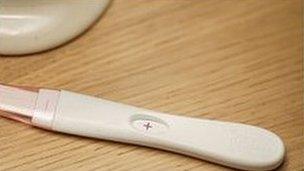Abortion clinics cleared for TV by advertising body
- Published
- comments

Not-for-profit pregnancy clinics are already allowed to advertise on TV and radio
Private clinics that charge for pregnancy services including abortions will be able to advertise on television and radio under new rules.
The Broadcast Committee of Advertising Practice (BCAP) said there was no justification for barring clinics offering post-conception advice services.
For-profit pregnancy centres can currently advertise in all media except television and radio.
The new rules, external take effect on 30 April.
BCAP said the adverts would be allowed as long as they were not harmful, offensive or misleading.
Pregnancy clinics that run on a not-for-profit basis are already allowed to advertise on television and radio.
'Robust protection'
In a statement, BCAP said existing rules on broadcast advertising would ensure general audiences were be robustly protected from harm or offence once the restrictions were removed.
It said it held a full public consultation last year but did not receive any response from the Department for Culture, Media and Sport or the Department of Health.
Clinics which do not directly refer women for terminations will have to make that clear in their advertising under the new rules.
The Committee of Advertising Practice (CAP) said this was on strong public health grounds.
Spokesman Matt Wilson said: "There is not going to be some sort of free-for-all saying 'Come to us to get an abortion'.
"They are not there to promote abortion, they have to promote an array of services. It is about being responsible, and commercial pro-life pregnancy services will now be able to advertise too."
Darinka Aleksic, from the pro-choice group Abortion Rights, said: "Surveys tell us that fewer than half of the UK population know where to turn when they are faced with an unplanned pregnancy - apart from going to their GP - and a lot of women, especially young women, they're not comfortable about talking to their regular GP about this.
"So it's really important that they have access to objective, accurate information about all their options when they're facing unplanned pregnancy and that includes parenting and adoption as well as abortion."
'Desensitise seriousness'
However, Conservative MP Nadine Dorries said the move would make having a termination seem "as easy as having your lunch".
"What this is actually going to do is desensitise what abortion is and the seriousness of it," she told the Daily Mail.
"That may be great for articulate, well-educated women who know exactly what they want but the more vulnerable woman who is in emotional turmoil is going to be badly damaged.
"Broadcasters will be making profit through advertising revenue off the back of a service which ends life. It's appalling."
Both pro-life and groups which offer abortion advice say this ruling will not see a surge of advertisements on television because more abortions are carried out by groups on behalf of the NHS.
In 2010, 96% of abortions were funded by the NHS, , external51% of which were carried out by independent clinics on behalf of the service.
'Right choice'
The Society for the Protection of Unborn Children (SPUC), a pro-life group, said advertising would be dominated by groups such as the British Pregnancy Advisory Services (BPAS) and Marie Stopes as they receive funds from the NHS to carry out abortions.
The campaign group said there were not any commercial pro-life pregnancy services as all pro-life groups were charities who could not afford broadcast advertising.
The group added that "Marie Stopes and their ilk" should have to declare that they offer abortion or have a financial interest in it.
"This decision will only serve the abortion industry's money-spinning trade which hurts women through killing their unborn children," added a spokesman.
A spokeswoman for BPAS said: "Unlike anti-abortion agencies, BPAS believes that whatever decision a woman makes - be that to keep or end the pregnancy - is equally valid.
"We are a not-for-profit charity; our only interest is in a woman making the choice that is right for her."
Marie Stopes said it would not be affected by the ruling as it too was a not-for-profit organisation.
CAP and BCAP are responsible for the self-regulation of the advertising industry under the watch of the Advertising Standards Authority (ASA).
In 2010, the ASA rejected complaints about the first UK television advertisement by an abortion advisory organisation.
The advertising watchdog said the advert for Marie Stopes, which ran on Channel 4, did not mention or advocate abortion.
- Published4 August 2010